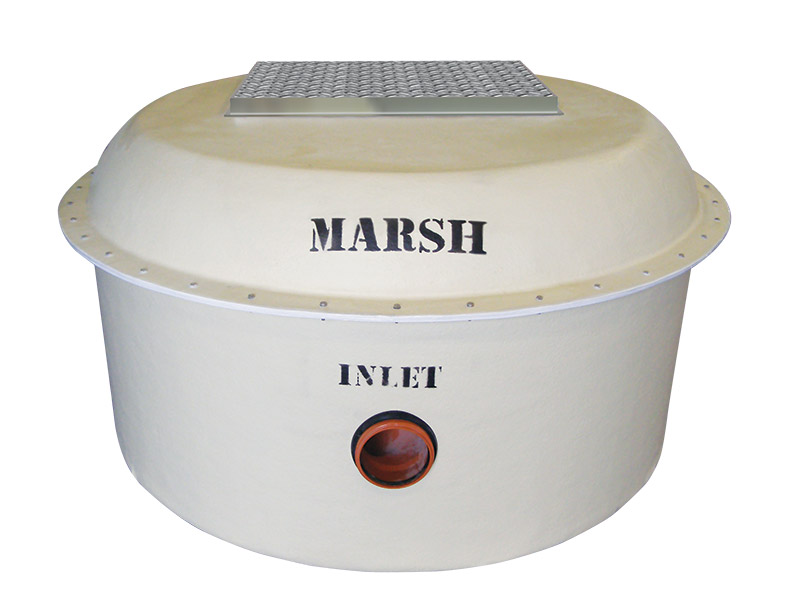Enquiries
Enquiries
We would be delighted to hear from you and will can to respond to your email enquiries within 24 hours. Thank you for your interest in Marsh Industries.

Our news
Keep up to date with Marsh Industries
Trash/debris barrier for sewers and off-mains drainage systems launched
09.10.2016

Introducing the Marsh Degrilleur, a unique bar screen storage chamber designed to prevent debris and non-biodegradable materials, such as wet wipes, hygienic wipelets, etc, from entering sewers, sewage treatment plants, pump stations and grease traps.
The unit, an essential purchase for commercial pump stations and sewage plants, is positioned ahead of the system inlet where it blocks incoming debris and forces it to rise to the top of the chamber. All debris and non-biodegradable materials are collected in a retaining trough for disposal.
The unit has no moving parts and requires no electrics, is available in two standard capacities – 2000 litres (MID-1) and 6000 litres (MID-2) – and is suitable for sewage treatment plants up to 125PE and single and twin pump stations up to 12000 litres. Larger capacity units are also available up to Ø2.7 x 3m deep.
In addition, the Degrilleur can be used as a flow splitting chamber in multi-stream sewage treatment plants or as an upstream trash screen as part of stormwater attenuation systems.
Prevention is better than cure
The old saying ‘prevention is better than cure’ is frequently used to make the case for preventing non-biodegradable materials from being flushed into public sewers and private sewage treatment systems.
When flushed into public sewers, these materials can clog drains and sewer pipes resulting in serious flooding, marine pollution and expensive clean-up operations. When flushed into private sewage treatment systems, these materials can prevent the operation and performance of pump stations, grease traps and package sewage treatment plants - often causing irreparable damage or expensive repairs – not to mention the environmental cost.
Yet, for the unwitting general public, it can be a struggle to accept this warning when providers of ‘wet wipes’ and other similar cleaning products use the word ‘flushable’ on their packaging and marketing collateral.
For example, on 22 September 2016, Wessex Water filed an official complaint with the Advertising Standards Authority (ASA) arguing providers of wet wipes should be banned from using the word ‘flushable' on their packaging. The company said “misleading branding and packaging gives users the impression wet wipes are flushable when in fact they clog up sewers, do not break down, and contribute to marine pollution.”
Similarly, on 12 July 2016, Anglian Water announced “wet wipes, cotton buds and wipelets cause £80m of damage each year to pump stations and sewage treatment systems”. The company estimate 800 tonnes of sanitary items are being flushed down the toilet every week in the East of England.
At Marsh Industries, we welcome the call by Wessex Water and Anglian Water for greater preventive measures to protect public and private sewerage systems. And whilst we encourage users to take better care when flushing materials down the toilet, we advocate ‘prevention is better than cure’ through the development of the Degrilleur trash barrier storage chamber that is specifically designed to prevent non-biodegradable materials from entering public or private sewage systems.
The Marsh Degrilleur is an intuitively sensible unit – so why let harm run its course when it could easily be avoided?
Contact Marsh Industries today to find out how we can help maintain your public or private sewage systems.
September 2016